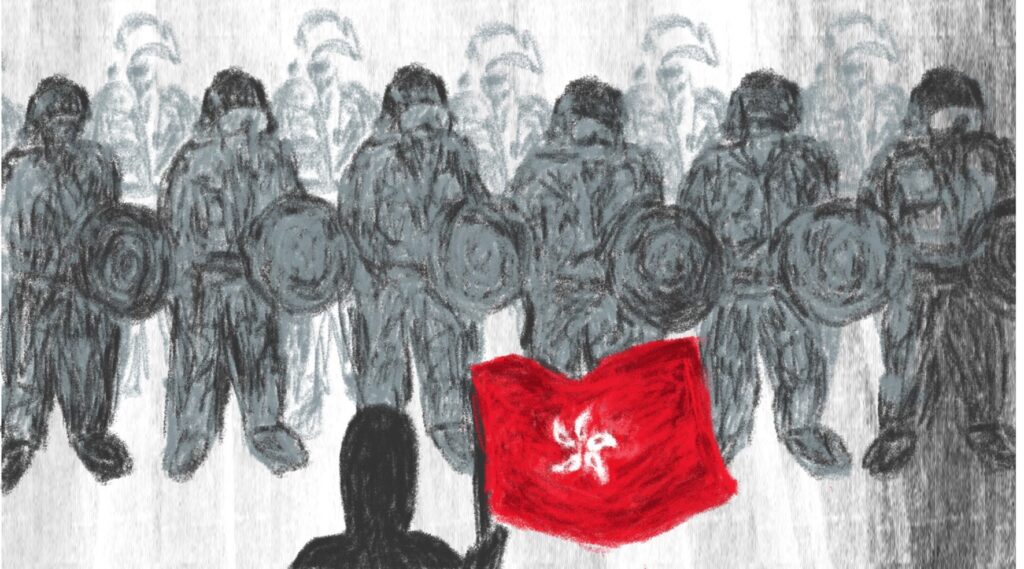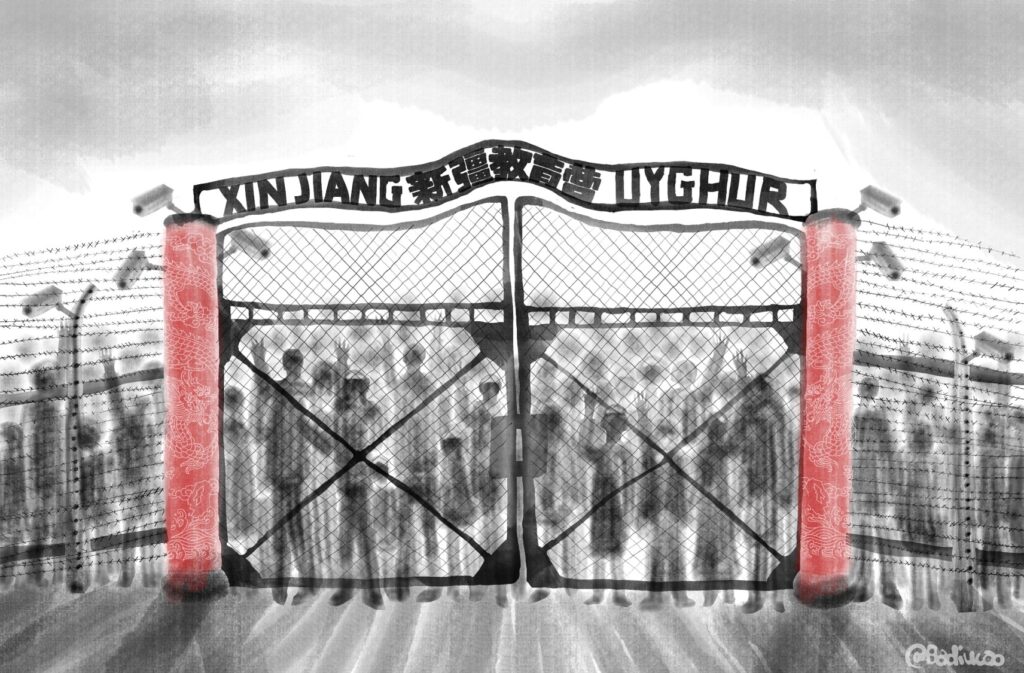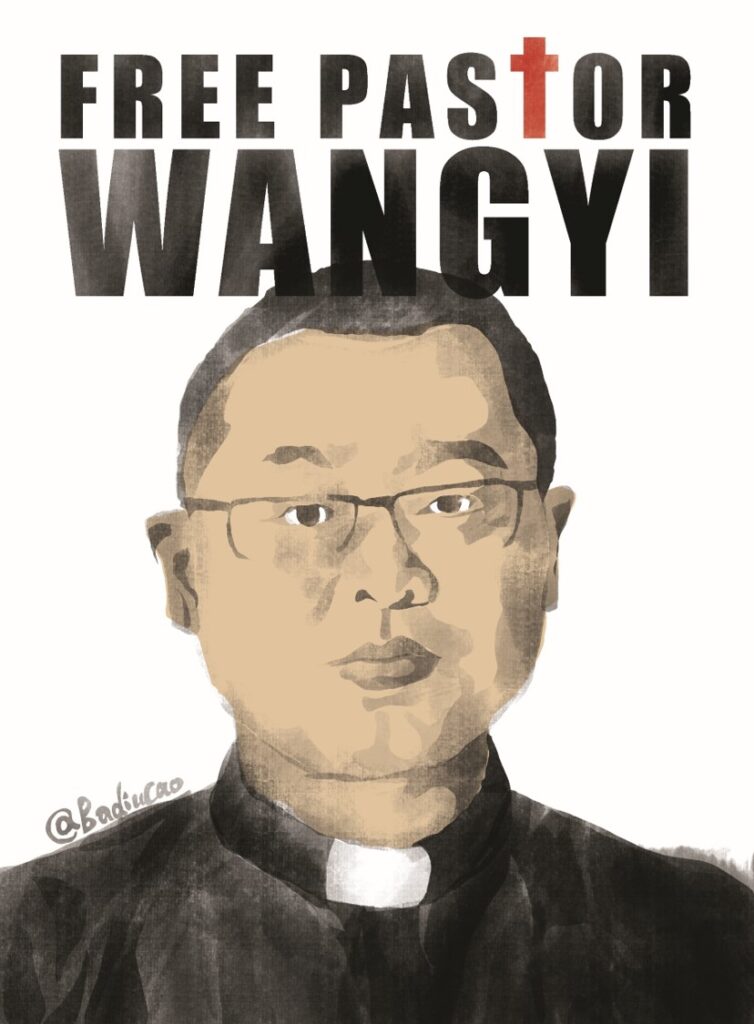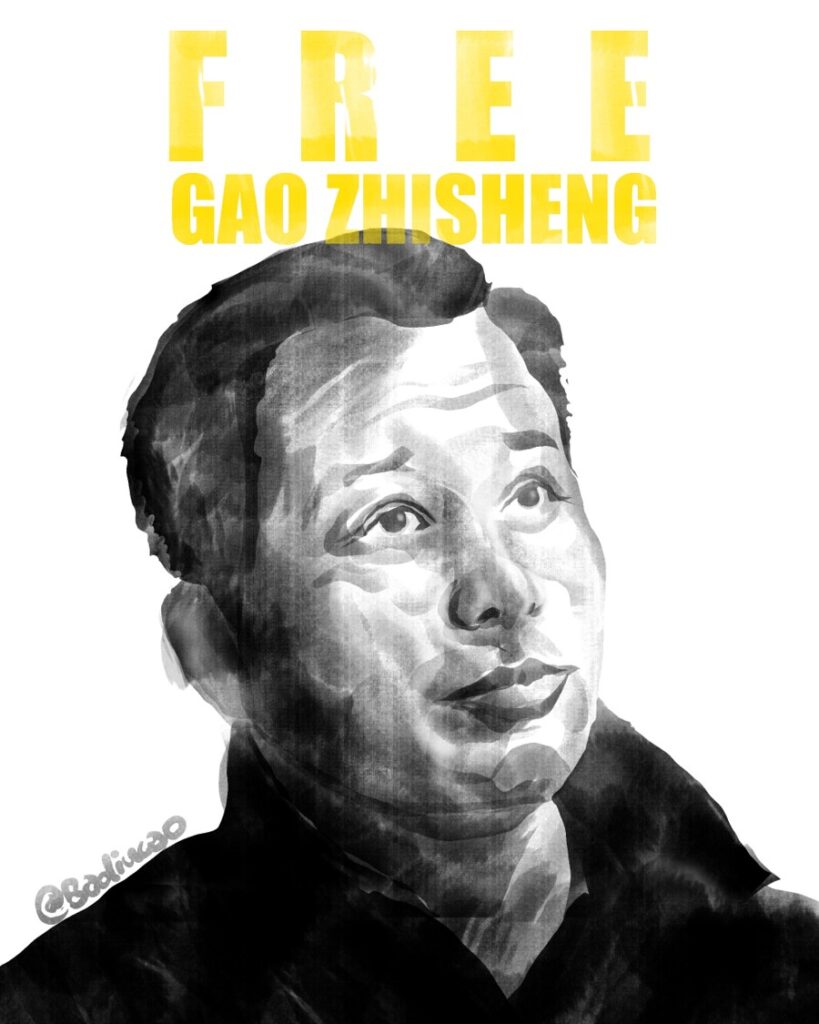
Crackdown in China: it’s time to end the silence on human rights atrocities
While the world looks away, atrocities committed by the Chinese Government grow ever more serious. Benedict Rogers asks readers to confront the horrifying reality of life in modern day China for ethnic and religious minorities.
China today faces the most severe and systematic crackdown on human rights since the Tiananmen massacre 31 years ago, and the worst assault on religion since the Cultural Revolution.
Across the board, over the past few years since Xi Jinping came to power in 2012, the Chinese Communist Party has intensified repression at home and escalated aggression abroad.
The regime now stands accused of committing atrocity crimes against the Uyghur Muslims which may reach the level of genocide; tearing up an international treaty by its flagrant destruction of Hong Kong’s autonomy; and persecuting Christians with an intensity not seen for decades. Grave violations of human rights continue in Tibet, and Taiwan is now increasingly in Xi Jinping’s sights.
A year ago an independent tribunal chaired by the British barrister who prosecuted Slobodan Milosevic, Sir Geoffrey Nice QC, found evidence of widespread and systematic forced organ harvesting from prisoners of conscience, amounting to crimes against humanity. Anyone engaging with the Chinese regime today, the China Tribunal’s judgment concluded, should be aware that they are “‘interacting with a criminal state”.
The blatant assault on Hong Kong’s freedoms is the most visible example of the regime’s audacity. Under the Sino-British Joint Declaration, an international treaty lodged at the United Nations that paved the way for the handover to Hong Kong in 1997, China committed to respecting Hong Kong’s basic freedoms, the rule of law and autonomy under the “one country, two systems” principle at least until 2047.
In recent years Hong Kong’s basic freedoms and autonomy have been increasingly eroded, but this year Beijing effectively tore up the agreement when it unilaterally imposed on Hong Kong, via the Communist Party’s National People’s Congress, a draconian national security law that destroys Hong Kong’s fundamental liberties and human rights. It criminalises “subversion”, “secession” and “collusion” with foreign political entities – making it potentially illegal for Hong Kongers to talk to foreign politicians, journalists or activists, to advocate for sanctions or to demand universal suffrage.

Since the imposition of the new law, we have seen the arrest of young activists, the banning of political slogans and songs, the withdrawal of sensitive books from libraries, the refusal of visas to certain journalists, the disqualification of pro-democracy candidates for election to the legislature and a year-long postponement of those same elections.
Article 38 of the security law has an extra-territorial application – theoretically anyone, anywhere in the world who violates Hong Kong’s security law, even if they are not a Hong Kong citizen and are acting outside the territory, could be criminalized. Arrest warrants have already been issued for six Hong Kongers living abroad, including Nathan Law, the most high-profile activist to escape the city. An increasing number of countries in the free world have suspended their extradition agreements with Hong Kong in response, but much more international action is needed.
The plight of the Uyghurs in China’s Xinjiang region is the most egregious of all the regime’s human rights violations.
At least a million, perhaps as many as three million, Uyghurs and other Muslims are held in prison camps, subjected to the worst forms of torture, sexual violence and slave labour.
Those outside the camps endure an Orwellian surveillance state, with a combination of facial-recognition technology, artificial intelligence, cameras on every street corner, frequent check-points and the presence of Chinese agents inhabiting Uyghur homes to watch their every move.
Religious freedom has been a primary casualty. Mosques have been destroyed, Muslim burial grounds desecrated and Muslims found praying, having long beards or wearing headscarves are accused of ‘extremism’ and thrown into the prison camps. Muslims are prohibited from fasting during Ramadan, or forced to eat pork and drink alcohol.
Children have been separated from their families and placed in boarding schools where they are forbidden from practising their faith, speaking their own language and are indoctrinated by Communist Party propaganda.
Evidence has emerged of the mass transportation of blindfolded Uyghurs on trains across the country, destined for forced labour facilities, and researcher Adrian Zenz has published research showing a campaign of forced sterilization and birth prevention targeting at least 80% of Uyghur women of childbearing age in the four Uyghur-populated prefectures – an action which, according to the 1948 Genocide Convention, could elevate this to the level of genocide.

Comparisons between other human rights scandals and the Holocaust are rarely wise and are understandably sensitive for the Jewish community, but, courageously, the President of the Board of Deputies of British Jews, Marie van der Zyl, wrote to the Chinese ambassador in London recently to make just such a link.
She observed “similarities between what is alleged to be happening in the People’s Republic of China today and what happened in Nazi Germany 75 years ago: People being forcibly loaded on to trains; beards of religious men being trimmed; women being sterilised; and the grim spectre of concentration camps.” Her letter followed front page coverage by the Jewish News of the discovery of 13 tonnes of Uyghur hair on a US-bound ship, describing this as having “Nazi resonance”.
Other faith leaders are also beginning to speak out. The Anglican Bishop of Rochester called for targeted sanctions against China in response to “gross human rights abuses”, and the President of the Federation of Asian Bishops’ Conferences, Cardinal Charles Bo of Myanmar, said:
“In China, the Uyghur Muslims are facing what amounts to some of the contemporary world’s worst mass atrocities and I urge the international community to investigate”.
Last weekend former Archbishop of Canterbury Rowan Williams and 75 other faith leaders including bishops, Cardinals, rabbis and imams, issued a statement calling for action.
But while the Uyghur crisis reaches the levels of atrocity crimes, Christians – Catholic and Protestant – also face a grave assault on religious freedom.
Thousands of crosses have been torn down, many churches destroyed or closed, and Christian clergy jailed.
According to a report published earlier this year by Christian Solidarity Worldwide (CSW) called Repressed, Removed, Re-educated: The stranglehold on religious life in China, one of the first to experience this new wave of repression was the Living Stone Church in Guizhou, closed in 2015. Both its pastors, Yang Hua and Su Tianfu, were arrested and accused of revealing state secrets, while Yang was imprisoned and threatened with death.
A church member told CSW: “The crackdown on Living Stone Church was like an experiment. Now the authorities see that this is an effective approach, they have adopted this approach in many different regions.”
Revised regulations on religion issued in 2018 show, according to this same Christian, “the government’s determination to tightly control the churches.”
Protestant pastor Wang Yi, jailed for nine years just after Christmas on charges of subversion – simply for stating that Xi Jinping is not God – has described the regime’s campaign as a “war against the soul”.

In state-controlled churches the authorities have forced Christians to display Communist Party propaganda banners alongside – or sometimes instead of – religious symbols, or to put up portraits of Xi Jinping alongside – or sometimes instead of – images of Christ.
Surveillance cameras have been mounted on altars, recording every worshipper who enters. Under-18s are prohibited from going to places of worship. The regime has even said it wants to produce a new translation of the Bible, to “reflect socialist values”.
Wang Yang, Chairman of the Chinese People’s Political Consultative Conference, which oversees ethnic and religious affairs, called for “a comprehensive evaluation of the existing religious classics, aiming at contents which do not conform to the progress of the times”.
Two years ago the Vatican signed an agreement with Beijing in an attempt to ‘normalise’ the status of the Catholic Church in China. While the Holy See’s intention was to better protect and unify Catholics, it has had the opposite result, leading to disunity in the Church and no improvement in religious freedom. If anything, life for Catholics has worsened. Not only were no Catholic clergy or laity released from prison before the deal – something that ought to have been made a precondition – but a number have been detained after the deal was signed.
Bishop James Su Zhimin of Baoding, for example, has spent a total of 40 years in prison, and his fate is still unknown. He has not been seen since 2003. Congressman Chris Smith recently held a hearing in the United States Congress titled: “Where is Bishop Su?”
Just two months after the deal was announced, another bishop, Peter Shao Zhumin of Wenzhou, was arrested for the fifth time in two years. He was released later that month, but continues to face harassment. Father Zhang Guilin and Father Wang Zhong of Chongli-Xiwanzi diocese were detained in late 2018 and their whereabouts are unknown.
In January this year, Bishop Vincent Guo Xijin of Mindong, Fujian Province, who had already been demoted to the position of auxiliary bishop to make way for a Beijing-appointed prelate, was forced by the authorities to leave his residence, which was then shut down. The 61 year-old cleric ended up sleeping in the doorway of his church office and only after an international outcry was he permitted to return to his apartment, but with the utilities cut off.
In June this year, 70 year-old Bishop Augustine Cui Tai, coadjutor bishop of the underground church in Xuanhua, was taken away again – having already endured 13 years in detention.
And then there is the fate of the brave lay people who are human rights defenders – lawyers, activists, civil society groups, bloggers, all of whom have been detained, disappeared, disbarred or shut down in recent years.
About 10 years ago I met a group of human rights lawyers in Beijing, who were defending religious freedom cases. We met in an open restaurant, and talked with some ease about the space that existed at the time. We all knew the Chinese Communist Party regime was repressive, we all knew there were restrictions and red lines, if no longer Red Guards. But within those limits, there was a certain freedom of movement. Now that freedom has been almost completely eliminated.
In July 2015 over 300 human rights lawyers and activists, along with their colleagues and family members, were rounded up and interrogated, detained and in some cases jailed or disappeared, in what became known as the ‘709 crackdown’.
In August 2017 China’s best-known human rights lawyer, Gao Zhisheng, who defended many religious freedom cases and had disappeared and been jailed multiple times previously, went missing again. He remains unaccounted for, three years on.

The regime also has a record of silencing – or even abducting – its critics from beyond its borders. Many critics of the regime living abroad, including myself, have received threatening letters, exiled Chinese have been targeted with more serious forms of harassment, and most significantly, Chinese-born Swedish national Gui Minhai was abducted from his holiday apartment in Thailand and is now serving a 10-year sentence in China – for publishing books exposing details about the private lives of China’s leaders.
In other words, this is a regime that will go to great lengths to suppress dissent and tighten its grip on power. And on the world stage – having unleashed the COVID-19 pandemic on the rest of us by its repression of the truth about the virus and silencing the whistleblowers – this regime behaves with a thuggishness that is rapidly losing it friends.
Traditional wisdom has it that there’s only one way to deal with a bully – and that is to stand up to him or her. The free world is beginning to do that, but needs to do more. We need targeted sanctions against individuals in the regime responsible for breaches of international law and grave violations of human rights. We need an inquiry to determine whether genocide or crimes against humanity have indeed been committed.
We need to diversify our supply chains and end our strategic economic dependency on China. The choice by individuals and enterprises to boycott Chinese products could start to have a powerful effect and might be the only thing Beijing listens to.
If there is a new Cold War, it is not one the democratic world has sought – it is one Xi Jinping’s regime started. But it is one we must prepare to fight.
China is a great nation, an ancient culture, a civilisation that has given the world so much. I have spent much of my adult life in and around China and have many Chinese friends. I love China. But the Chinese Communist Party is destroying the human dignity of China’s people and threatens our own freedoms too. It is high time that the world woke up to these dangers – before it is too late.
Like what you’ve read? Consider supporting the work of Adamah by making a donation and help us keep exploring life’s big (and not so big) issues!



One Comment
Frank Ulcickas
Excellent article with which I am basic agreement. However, unlike saying the world is silent, your article reads like a speech U.S. President Trump delivers over and over. The Media here and globalist liberal politicians label him and his words as racist and xenophobic.
The powerhouse U.S.economy is perhaps the strongest tool to help thwart the CCP intentions.
So too would it beneficial and moral for Pope Francis to break his silence regarding Chinese attacks on religious leaders.